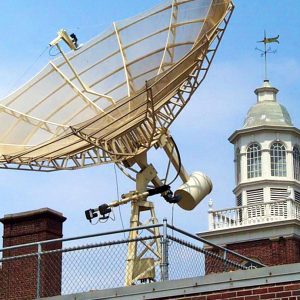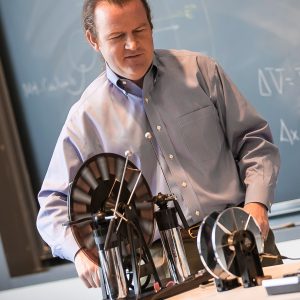Program
In the Physics program at Lafayette, you will study the world at its most fundamental level while also gaining skills applicable to a wide range of technical fields, engineering, computing, quantitative analysis.
Please note: several courses linked here were added in Fall 2024, and have not yet propagated to main catalog page. If a link is broken, please check the descriptions on our Courses page.
First-Year students and others seeking introductory physics courses
Please see the First-year Course Selection Advice and Choosing the Right Physics Course pages for guidance on choosing introductory physics courses.
B.S. in Physics
The Physics major requirements were revised in Fall 2024. Students who declared a Physics major in or before Spring 2024 should consult with their advisor on how to appropriately manage these changes. The old requirements can be found here.
The requirements for the B.S. degree in Physics are:
- Three introductory physics courses: Phys 130; Phys 131 or Phys 151; and Phys 133 or Phys 152
- Two Intermediate physics courses: Phys 215 and Phys 238
- Quantum Theory: Phys 351
- Three of the following electives: Phys 314, Phys 327, Phys 335, Phys 338, Phys 342
- One additional physics elective numbered 300 or higher
- Two additional physics electives numbered 200 or higher
- Math 161, Math 162, Math 263, and Math 264.
- One elective in Math, Computer Science, and Computational Methods, or Phys 314
Any given course can fulfill only one requirement. In particular, PHYS 314 can fulfill a physics elective requirement or the Math/CS/CM/PHYS 314 requirement, but not both.
See also the note on Course Substitutions below.
A.B. in Physics
The Physics major requirements were revised in Fall 2024. Students who declared a Physics major in or before Spring 2024 should consult with their advisor on how to appropriately manage these changes. The old requirements can be found here.
The requirements for the A.B. degree in Physics are:
- Three introductory physics courses: Phys 130; Phys 131 or Phys 151; and Phys 133 or Phys 152
- Two Intermediate physics courses: Phys 215 and Phys 238
- Quantum Theory: Phys 351
- One physics elective numbered 300 or above (this requirement may not be fulfilled by an independent study or honors thesis)
- Two physics electives numbered 200 or above
- One additional physics elective
- Math 161, Math 162, Math 263, and Math 264
See also the note on Course Substitutions below.
Concentration in Astronomy
The requirements for the A.B. or B.S. in Physics with a concentration in Astronomy are:
- Complete the requirements for either the A.B. or B.S. degree in Physics
- For the B.S. degree, two of the physics electives must be Phys 208, Phys 304 or Phys 308
- For the A.B. degree, one physics course must be chosen from Phys 104, Phys 108, Phys 208, Phys 304 or Phys 308. A second elective must also be chosen from Phys 208, Phys 304 or Phys 308.
Minor in Physics
The Minor in Physics requires a sequence of six Physics courses which must include a two-semester introductory calculus-based sequence (i.e. Phys 131-133, or Phys 151-152) and 215. The three additional Physics courses must be numbered 110 or above, and only one credit of individualized instruction (numbers 390-398 or 490-498) may be fulfill this requirement.
Typical Course Patterns
Shown below are some typical course patterns for fulfilling the physics degree requirements, particularly in the first two years of study. Depending on your interests and background, however, there may be other possibilities or options available. Please consult with any physics faculty member about the opportunities available to you.
| Year | Fall | Spring |
| 1st | Phys 130 | Phys 131 or Phys 151 |
| Math 161 | Math 162 | |
| FYS | Elective | |
| Elective | Elective | |
| 2nd | Phys 133 or Phys 152 | Phys 215 |
| Elective | Phys 238 | |
| Math 263 | Math 264 | |
| Elective | Elective | |
| 3rd | Phys 351 | Elective |
| Electives and Advanced Physics Courses | Electives and Advanced Physics Courses | |
| 4th | Electives and Advanced Physics Courses | Electives and Advanced Physics Courses |
Starting Spring of First Year
Sometimes students take their first physics course in the spring of their first year. In this situation, the only change from the pattern above is that Phys 130 should be taken any subsequent fall semester.
Course Substitutions for Physics A.B. and B.S requirements
In special circumstances, students who have taken advanced electrical and computer engineering or mechanical engineering courses in electromagnetic theory, electronics, dynamics, or thermodynamics may waive certain of the required courses with approval of the head of the physics department and the Academic Progress Committee.
Advanced courses from other science or engineering departments may be substituted for physics elective courses and up to two required physics courses with the approval of the head of the physics department and the Academic Progress Committee, when doing so will produce a coherent program of physics applied to an interdisciplinary field such as material science, biophysics, geophysics, etc.






